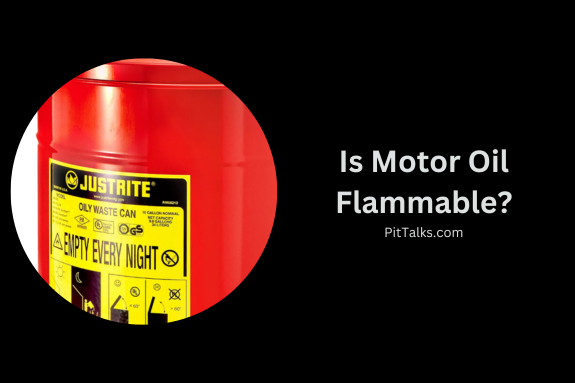Last Updated on August 19, 2023 by Pittalks
In the world of automotive care, one question that often pops up is, “Is motor oil flammable?” The short answer is both yes and no.
While motor oil can indeed catch fire under certain conditions, it does not meet the technical classification of a flammable liquid according to the Occupational Safety and Health Administration (OSHA).
The key lies in understanding the physical properties of motor oil. Composed of long chains of hydrocarbons, motor oil has a high flashpoint—the temperature at which it can ignite. Since motor oil’s flashpoint is well above the threshold set by OSHA for flammable liquids, motor oil is technically classified as combustible, not flammable. So what else do you need to know? Keep reading to find out!
How Flammable Is Motor Oil? Will Oil Catch Fire?
Motor oil’s ability to ignite and burn depends largely on its temperature. At room temperatures, motor oil does not produce the vapors necessary for ignition. However, when heated to its flash point, an engine oil fire can be created. The flashpoint of conventional motor oil is approximately 419 degrees Fahrenheit (215 degrees Celsius).
This means that while a motor vehicle’s engine oil is not flammable under normal conditions, it can become a fire hazard when subjected to high heat. For instance, if motor oil leaks onto a hot engine part, it could potentially ignite.

What Keeps Motor Oil From Being Flammable?
The reason motor oil is not classified as a flammable liquid lies in its chemical structure. Unlike those considered flammable as liquids, which typically consist of short chains of hydrocarbons, motor oil is made up of long hydrocarbon chains. These long molecules require more energy to break apart and form vapors, the key ingredient necessary for ignition.
This higher energy requirement means that motor oil does not vaporize easily at or around room temperature. Instead, it requires a much higher temperature to weaken the intermolecular forces enough to produce vapors. This is why motor oil has a relatively high flashpoint and why crude oil is not classified as a flammable liquid.
Here’s a video showing exactly the flammability and flashpoints of different engine oils:
Does It Have A Flashpoint?
Yes, motor oil does have a flashpoint. The flashpoint is the temperature at which a substance gives off enough vapors to ignite when exposed to a spark or ignition source. For conventional motor oil, the flashpoint is around 419 degrees Fahrenheit (215 degrees Celsius). This flash point means that motor oil must be heated to this temperature before it can catch fire.
What’s The Flashpoint of Motor Oil?
The exact flashpoint of motor oil can vary depending on the specific type and brand. However, for conventional motor oil, the flashpoint is typically around 419 degrees Fahrenheit (215 degrees Celsius).
This is significantly higher than the flashpoints of most flammable liquids and engine oils. For instance, gasoline, a common flammable liquid, has a flashpoint of -40 degrees Fahrenheit (-40 degrees Celsius). This means that gasoline can ignite at much lower temperatures than motor oil.
Do Different Types of Oil Have Different Flashpoints? (Conventional, Semi-Synthetic, and Full Synthetic)
Different types of motor and engine oil used do indeed have different flashpoints. For instance, synthetic motor oils are designed to withstand higher temperatures without burning or breaking down. This is because the molecules in synthetic oil behave differently under heat, becoming more fluid and less likely to vaporize.
As a result, synthetic motor oils typically have a higher flashpoint than conventional motor oils. Some synthetic motor oils have a flashpoint of around 450 degrees Fahrenheit, while more specialized synthetic oils can have a flashpoint of up to 700 degrees Fahrenheit.
| Type of Oil | Flashpoint (°F) | Flashpoint (°C) |
|---|---|---|
| Motor Oil (Conventional) | Estimated: 419°F | Estimated: 215°C |
| Semi-Synthetic Motor Oil | Estimated range: 430°F - 480°F | Estimated range: 221°C - 249°C |
| Synthetic Motor Oil | Estimated range: 450°F - 700°F | Estimated range: 232°C - 371°C |
How To Properly Store Motor Oil
Proper storage of motor oil is essential to prevent the fire hazard of burning oil. Here are some tips on how to store motor oil safely:
Store in a Cool, Dry Place: Motor oil should be stored in a cool, dry place away from heat sources. This will help prevent the oil from reaching its flashpoint and igniting.
Use Appropriate Containers: Motor oil should be stored in appropriate containers that are resistant to heat and chemicals. These containers should also be sealed to prevent the escape of vapors.
Keep Away from Ignition Sources: Motor oil should be kept away from potential sources of ignition, such as open flames or sparks. This will help prevent accidental ignition of the oil.
Follow Local Regulations: Different regions may have different regulations regarding the storage of motor oil. Be sure to follow these regulations to ensure the safe storage of motor oil.
How To Reduce Other Flammability Risks
Besides proper storage, there are other ways to reduce the flammability catches fire risks associated with motor oil:
Regularly Check for Leaks: Regularly check your vehicle for oil leaks. If motor oil leaks onto hot engine parts, it could potentially ignite.
Use a Fire Extinguisher: Keep a fire extinguisher handy when working with motor oil. In the event of a fire, a fire extinguisher can help you quickly put out the flames.
Follow Safety Precautions: Always follow safety precautions when working with motor oil. This includes wearing protective gear and working in a well-ventilated area.
Read more from the flammability series:
Is diesel flammable?
Is hydraulic fluid flammable?
Is power steering fluid flammable?
Is coolant flammable?
Is trans fluid flammable?
Is brake fluid flammable?
FAQs and Related Questions
Here are some frequently asked questions and related topics regarding the flammability of motor oil:
Is Used Motor Oil More Flammable?: Used motor oil is not more flammable than fresh motor oil. However, used motor oil can contain residue and burnt bits that may cause excessive overheating if the dirty oil remains in the engine.
Is It Safe to Burn Motor Oil in a Fire Pit?: While it is technically possible to burn motor oil in a fire pit, it is not recommended. Motor oil burns at a very high temperature and can produce harmful fumes.
How Should I Dispose of Used Motor Oil?: Used motor oil should be disposed of properly to prevent environmental damage. Many auto repair shops and recycling facilities accept used motor oil for disposal.
In conclusion, while motor oil is not technically classified as a flammable liquid, it can catch fire under certain conditions. Therefore, it’s important to handle and store motor oil properly to prevent potential fire hazards.

